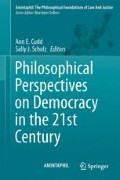Abstract
Ideally, democratic citizens enjoy equal opportunity to deliberate, vote, and express feedback, as well as equal voice enabling them to civically participate in order to further their interests and concerns. To take full advantage of these equalities, journalism must serve as an effective mechanism to ensure that citizens are able to participate. Many news stories feature personal and dramatic elements of events exclusively (narrow-context information), but those hoping to become informed and motivated require socially contextualized (broad-context) information as well. In this chapter, I argue that the journalistic presentation of hybrid accounts consisting of narrow- and broad-context information best enables citizens to become informed about, and motivated to resolve, societal problems.
Access this chapter
Tax calculation will be finalised at checkout
Purchases are for personal use only
Notes
- 1.
Voting “correctly” means that citizens would select “the choice which would have been made under conditions of full information” (Lau and Redlawsk 1997, 586).
- 2.
The segments cut from this story were additional eyewitness accounts that offered no broad-context information and their omission was intended to save space.
- 3.
Selective attention concerns internally situated processing that is automatic and unconscious. Framing concerns externally situated processing that involves the conscious choosing of information and emphasis performed by journalists. Due to this difference, selective attention and framing are not identical.
- 4.
The segments cut from this story were mere filler and their omission was intended to save space.
References
Anderson, E. 2006. The epistemology of democracy. Episteme 3(1–2): 8–22.
Anderson, E. 2007. Fair opportunity in education: A democratic equality perspective. Ethics 117(4): 595–622.
Bennett, W.L. 2008. News: The politics of illusion, 8th ed. New York: Pearson/Longman.
Brown, M.J. 2010. Genuine problems and the significance of science. Contemporary Pragmatism 7(2): 131–153.
Coleman, R., and E. Thorson. 2002. The effects of news stories that put crime and violence into context: Testing the public health model of reporting. Journal of Health Communication 7(5): 401–425. doi:10.1080/10810730290001783.
Entman, R.M. 1993. Framing: Toward clarification of a fractured paradigm. Journal of Communication 43(4): 51–58. doi:10.1111/j.1460-2466.1993.tb01304.x.
Gross, K. 2008. Framing persuasive appeals: Episodic and thematic framing, emotional response, and policy opinion. Political Psychology 29(2): 169–192. doi:10.1111/j.1467-9221.2008.00622.x.
Hopkins, A., and P. Zengerle. 2007. English major blamed for Virginia Tech shooting. Reuters. http://www.reuters.com/article/2007/04/17/us-usa-crime-shooting-idUSN1631133620070417. Accessed 26 Aug 2012.
Iyengar, S. 1994. Is anyone responsible? How television frames political issues. Chicago: University of Chicago Press.
James, W. 1967. The stream of thought. In The writings of William James: A comprehensive edition, ed. J.J. McDermott, 21–74. New York: Random House.
Lau, R., and D. Redlawsk. 1997. Voting correctly. American Political Science Review 91(3): 585–598.
Author information
Authors and Affiliations
Corresponding author
Editor information
Editors and Affiliations
Rights and permissions
Copyright information
© 2014 Springer International Publishing Switzerland
About this chapter
Cite this chapter
Waltz, R.W. (2014). Journalists as Purveyors of Partial Truths. In: Cudd, A., Scholz, S. (eds) Philosophical Perspectives on Democracy in the 21st Century. AMINTAPHIL: The Philosophical Foundations of Law and Justice, vol 5. Springer, Cham. https://doi.org/10.1007/978-3-319-02312-0_15
Download citation
DOI: https://doi.org/10.1007/978-3-319-02312-0_15
Published:
Publisher Name: Springer, Cham
Print ISBN: 978-3-319-02311-3
Online ISBN: 978-3-319-02312-0
eBook Packages: Humanities, Social Sciences and LawPhilosophy and Religion (R0)

